新人教版八年级下册英语语言点总结
人教版初中英语八年级下册全册各单元知识点、语法归纳整理
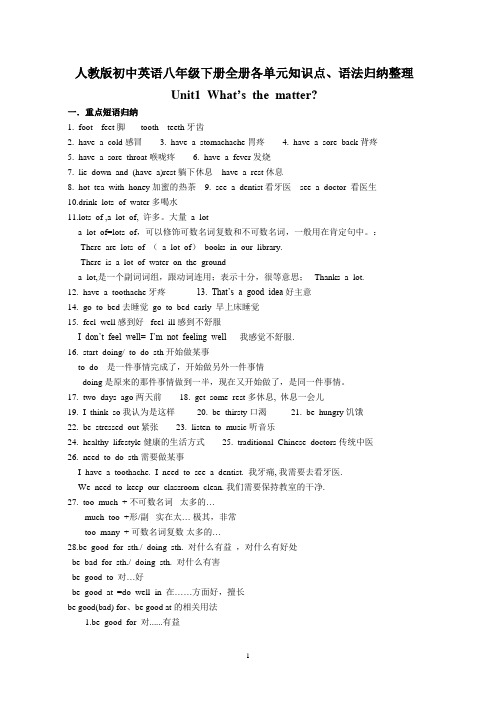
人教版初中英语八年级下册全册各单元知识点、语法归纳整理Unit1 W hat’s the matter?一.重点短语归纳1. foot---feet 脚tooth---teeth 牙齿2. have a cold 感冒3. have a stomachache 胃疼4. have a sore back背疼5. have a sore throat喉咙疼6. have a fever发烧7. lie down and (have a)rest 躺下休息have a rest 休息8. hot tea with honey 加蜜的热茶9. see a dentist 看牙医see a doctor 看医生10.drink lots of water多喝水11.lots of ,a lot of, 许多。
大量a lota lot of=lots of,可以修饰可数名词复数和不可数名词,一般用在肯定句中。
:There are lots of (a lot of)books in our library.There is a lot of water on the grounda lot,是一个副词词组,跟动词连用;表示十分,很等意思;Thanks a lot.12. have a toothache牙疼13. That’s a good idea好主意14. go to bed 去睡觉go to bed early 早上床睡觉15. feel well感到好 feel ill 感到不舒服I don’t feel well= I’m not feeling well我感觉不舒服.16. start doing/ to do sth开始做某事to do 是一件事情完成了,开始做另外一件事情doing是原来的那件事情做到一半,现在又开始做了,是同一件事情。
17. two days ago两天前18. get some rest 多休息, 休息一会儿19. I think so我认为是这样20. be thirsty口渴21. be hungry 饥饿22. be stressed out紧张23. listen to music听音乐24. healthy lifestyle健康的生活方式25. traditional Chinese doctors传统中医26. need to do sth 需要做某事I have a toothache. I need to see a dentist. 我牙痛, 我需要去看牙医.We need to keep our classroom clean. 我们需要保持教室的干净.27. too much + 不可数名词太多的…much too +形/副实在太…极其,非常too many + 可数名词复数太多的…28.be good for sth./ doing sth. 对什么有益,对什么有好处be bad for sth./ doing sth. 对什么有害be good to 对…好be good at =do well in 在……方面好,擅长be good(bad) for、be good at的相关用法1.be good for 对......有益Doing morning exercises is good for your health.做早操对你们的建康有益。
英语八下人教版重点语法

英语八下人教版重点语法
英语八下人教版的重点语法包括:
1.过去完成时(Past Perfect Tense):用来表示在过去某个时间或动作之前已经发生或完成的动作。
例如:I had already
finished my homework before my mom came back.
2.时间状语从句(Time clauses):用来表示时间关系的从句,一般以when,as soon as,until,before,after等引导。
例如:We will go to the park when it stops raining.
3.条件状语从句(Conditional clauses):用来表示假设条件的从句,一般以if引导。
例如:If it rains tomorrow, we will stay at home.
4.动词不定式(Infinitives):用来表示目的、原因、建议等。
例如:I went to the store to buy some groceries.
5.被动语态(Passive voice):用来强调动作的承受者而不是执行者。
例如:The cake was made by my mom.
6.定语从句(Relative clauses):用来修饰名词或代词的从句,一般由关系代词who,which,that引导。
例如:The boy who won
the competition is my neighbor.
这些语法结构在英语八下人教版教材中经常出现,需要学生掌握
和应用。
希望以上回答能对您有帮助。
人教版八年级英语下册各知识点归纳总结(最新最全)

人教版八年级英语下册各知识点归纳总结(最新最全)Unit 1 What's the Matter?Phrases:1.too much - an excessive amount2.XXX down - recline3.get an X-ray - have an X-ray n4.take one's temperature - measure one's body temperature5.put some medicine on - XXX6.have a fever - have a high body temperaturea break - rest8.without thinking twice - XXX9.get off - exit from10.take sb to the hospital - XXX11.wait for - stay in place until something happens12.to one's surprise - surprisingly13.thanks to - due to14.in time - punctually15.think about - consider16.have a heart problem - have a cardiac issue17.get into trouble - encounter difficulties18.do the right thing - act correctly19.fall down - trip and fall20.put。
on sth - place something on top of something else21.get hit/sunburned - XXX the sun22.be interested in - have an interest in23XXX24.take risks/take a risk - take a chance25.lose one's life - pass away26.because of - due to27.run out of - exhaust the supply of28.cut off - severUsage:1.need to do sth - require to do something2.see sb doing sth - observe someone doing something3.ask sb sth - XXX4.expect sb to do sth - anticipate XXX do something5.agree to do sth - consent to do something6.help sb (to) do sth - assist XXX do something7.want to do sth - have a desire to do something8.tell sb to do sth - instruct XXX do somethingXXXWhat's the matter (with you)?" is a common way to ask about someone's health or if they are XXX。
人教版八年级下册英语知识点归纳总结

人教版八年级下册英语知识点归纳总结以下是八年级下册英语的知识点归纳总结:一、重点短语1. 擅长于……2. 为……做准备3. 当然4. 与……做同样的事情5. 享受做……的乐趣6. 对……感到兴奋7. 很遗憾8. 以……的速度9. 在某人的业余时间10. 在……岁时二、重点句型1. It is + 形容词 + to do sth.2. It takes sb. some time to do sth.3. sb. spends some time/money on sth.4. How do you find sth.?5. What do you think of sth.?6. Why don’t you do sth.?7. What would you like to do?8. What’s the meaning of the word/phrase?9. Please + 动词原形,表示请求。
10. If引导的条件状语从句。
三、重点语法1. 现在完成时态:have/has + 过去分词,常与already, ever, just等副词连用。
2. 现在进行时态:be + 动词现在分词,表示正在进行的动作或存在的状态。
3. 情态动词:can, may, must等,表示推测、可能性或必要性等。
4. 频率副词:always, usually, often, sometimes, seldom, never等,表示动作发生的频率。
5. 连词:and, but, or, so等,表示句子之间的逻辑关系。
6. 介词:in, on, at等,表示时间、地点等。
7. 形容词的比较级和最高级。
8. 疑问词+to do sth.作宾语。
9. 不定代词somebody, something等。
10. 动词不定式的基本形式和用法。
11. 疑问句和否定句的构成。
12. 祈使句的构成。
13. 并列句的构成。
八年级下册英语各单元重点短语+句型语法 人教版

八年级下册英语各单元重点短语+句型语法人教版1. Unit 1Important phrases:- get to know: I want to get to know my new classmates.- make friends with: I hope to make friends with some local students.- be interested in: She is interested in learning a new language.- take part in: Are you going to take part in the school talent show?- show off: Don't show off in front of your friends.- be proud of: I am proud of my brother for winning the race.Sentence patterns and grammar:- Present continuous tense: He is playing football in the park.- Comparative adjectives: My sister is taller than me.- Superlative adjectives: This is the best pizza I've ever tasted.2. Unit 2Important phrases:- turn off: Don't forget to turn off the lights before you leave.- set off: We will set off for the beach early in the morning.- look forward to: I am looking forward to the schooltrip next week.- get along with: I get along with my classmates very well.- break down: Our car broke down on the way to the airport.- run out of: We ran out of milk, so I need to go to the store.Sentence patterns and grammar:- Past continuous tense: They were playing basketball when the rain started.- Modal verbs: You should study harder for the exam.- Reported speech: She said that she was going to the movies.3. Unit 3Important phrases:- be strict with: My teacher is very strict with homework deadlines.- get into: She wants to get into a good university.- take care of: Don't forget to take care of your little brother.- be good at: I am good at playing the piano.- look up to: I look up to my older sister as a role model.- come up with: We need to come up with a plan for the project.Sentence patterns and grammar:- Future perfect tense: By next year, I will havefinished high school.- Present perfect continuous tense: She has been studying English for five years.- Conditional sentences: If I had known, I would have helped you.4. Unit 4Important phrases:- call for: This situation calls for a serious discussion.- hold on: Please hold on while I transfer your call.- look out: Look out for the car coming down the road.- put off: Don't put off until tomorrow what you can do today.- try out: I want to try out for the school basketball team.- fall apart: Our friendship fell apart after the argument.Sentence patterns and grammar:- Present perfect tense: I have finished my homework.- Past perfect tense: She had already left when I arrived.- Passive voice: The cake was made by my mom.5. Unit 5Important phrases:- set up: We need to set up the equipment for the presentation.- take off: The plane will take off in an hour.- go through: I will go through my notes before the exam.- look into: The police will look into the matter.- pick up: Can you pick up some milk on your way home?- be satisfied with: I am satisfied with my test results.Sentence patterns and grammar:- Future continuous tense: They will be having dinner at7 PM.- Reported questions: He asked her where she was goingfor the holidays.- Relative clauses: The boy who won the race is my friend.6. Unit 6Important phrases:- be proud of: She is proud of her achievements.- look after: My sister looks after our pet dog.- give up: Don't give up on your dreams.- make a decision: I need to make a decision about which college to attend.- put up with: I can't put up with his behavior any longer.- take after: My son takes after his father in terms of looks.Sentence patterns and grammar:- Past perfect continuous tense: She had been studying all night when her parents arrived.- Reported commands: He told her to clean her room.- Adverb clauses: I will call you when I get home.。
英语八下语法知识点人教版

以下是一些人教版八年级下册的英语语法知识点:
1. 情态动词的使用:如“will,can,should,may”等。
2. 现在完成时的理解与运用:表示过去发生的动作对现
在造成的结果。
3. 现在进行时的理解与运用:表示正在进行的动作或存
在的状态。
4. 动词不定式的理解与运用:表示未来的动作或存在的
状态。
5. 形容词和副词的比较级和最高级:如“more,less,least,most”等。
6. 被动语态的理解与运用:表示主语是动作的承受者。
7. 宾语从句的理解与运用:在句子中充当宾语的成分。
8. 状语从句的理解与运用:修饰动词、形容词、副词等。
9. 祈使句的理解与运用:表示请求、命令、建议等。
10. 反意疑问句的理解与运用:表示对陈述部分的肯定或
否定。
这些知识点都是学习英语语法的基础,需要同学们在学习
中不断练习和巩固。
如果有任何不理解的地方,可以向老师
或同学寻求帮助。
英语八下人教版重点语法

英语八下人教版重点语法英语学习中,语法是非常重要的一部分。
掌握好语法规则,不仅能够提高学生的语言表达能力,还能够帮助学生更好地理解和应用英语。
下面是英语八下人教版教材中的一些重点语法知识,希望对大家的学习有所帮助。
1. 一般现在时一般现在时是最基础的时态之一,表示经常性的、习惯性的或普遍性的动作或状态。
其构成形式是主语 + 动词原形(单三形式加-s或-es)。
例如:- We play football every Sunday.- He often brushes his teeth after meals.- The sun rises in the east.2. 一般过去时一般过去时用来表示在过去某个时间发生的或者惯常发生的动作或状态,其构成形式是主语 + 动词过去式。
例如:- I went to the park yesterday.- They studied English last night.- She visited her grandparents last summer.3. 一般将来时形式是主语 + will + 动词原形。
例如:- I will go to Beijing next month.- They will have a party on Saturday.- She will buy a new car in the future.4. 现在进行时现在进行时表示此时此刻正在进行的动作,其构成形式是主语 + am/is/are + 现在分词。
例如:- We are watching a movie now.- He is having lunch at the moment.- They are playing games in the park.5. 过去进行时过去进行时表示过去某个时间点正在进行的动作,其构成形式是主语 + was/were + 现在分词。
人教版英语八年级下册知识点总结

人教版英语八年级下册知识点总结一、语法知识点1. 时态:掌握一般现在时、一般过去时、一般将来时、现在进行时、过去进行时、过去将来时等时态的用法。
2. 过去进行时:用于表示过去某一时间正在进行的动作或状态。
3. 以下代词和副词的用法:- somebody, anybody, nobody, everybody 可用作主语或宾语。
- something, anything, nothing, everything 可用作主语或宾语。
- somewhere, anywhere, nowhere, everywhere 可用作地点副词。
4. 句型:掌握各种基本句型,如祈使句、选择疑问句、反义疑问句等。
5. 状语从句:掌握时间、原因、结果、条件等类型的状语从句的用法,并注意从句的引导词。
6. 定语从句:研究使用关系代词 who, whom, whose, which, that 引导定语从句,并了解先行词和关系词在从句中的作用关系。
二、词汇知识点1. 词汇拼写和用法:巩固和扩大基础词汇量,掌握词汇的正确拼写和用法。
2. 同义词和反义词:研究常用的同义词和反义词,提高词汇表达的能力。
3. 词组和固定搭配:掌握常用的词组和固定搭配,能够灵活运用。
三、阅读知识点1. 阅读理解:提高阅读理解能力,掌握快速获取信息的技巧。
2. 阅读策略:研究使用各种阅读策略,如扫读、略读、详读、推断等。
3. 阅读技巧:培养良好的阅读惯和技巧,如划重点、标记陌生单词等。
四、写作知识点1. 写作结构和组织:研究写作时合理安排文章结构和组织思路,使内容连贯。
2. 信息衔接和过渡:掌握信息衔接和过渡的方法,使文章各部分之间有逻辑性。
3. 词汇和句型运用:运用丰富的词汇和多样的句型,提高写作表达的准确性和流畅性。
以上为人教版英语八年级下册的主要知识点总结,希望能帮到你!。
初二英语下册知识点总结人教版

初二英语下册知识点总结人教版Unit 1Where's your pen pal from?知识点梳理:1.学习目标重点能够运用句型Where's your pen pal from?He/She's from… 进行交流,让学生能够初步了解及使用国家名称。
复习巩固本单元的国家名称,能够熟练朗读及拼写所学国家的名称。
2.句型-Where's your pen pal from? He's from Canada.-Is it a big city? Yes, it's a big city.3.单词Canada, Australia, Japan, pen pal, New York, London, Dublin, big, interesting, small 4.语言点Where's your pen pal from? He's from…Is it a big city? Yes, it's a big city.知识串记:1、Country and city英国 the UK 伦敦 London美国 the USA 纽约 New York加拿大 Canada澳大利亚 Australia爱尔兰 Ireland 都柏林 Dublin日本 Japan2、形容词比较级big huge small littleinteresting 更有趣的 boring 更无聊的good 好的 better 更好的3、句型Where is your pen pal from?他的笔友来自哪里?He/She is from…他/她来自……Is it a big city? 这是个大城市吗?Yes, it is. 是的,是个大城市。
No, it isn't.不,它不是。
Unit 2Where's the post office?知识点梳理:1.学习目标重点使学生通过Where’s the post office?等句型,初步了解并积累城市中的地理学习内容,对城市地理位置的认知。
人教版英语八年级下册知识点总结全部
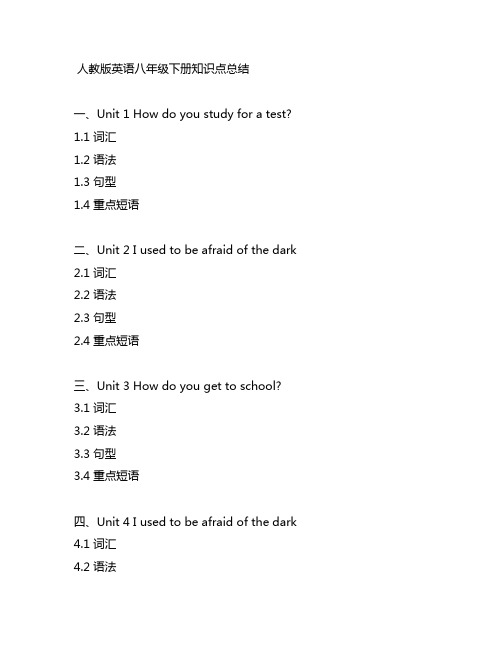
人教版英语八年级下册知识点总结一、Unit 1 How do you study for a test?1.1 词汇1.2 语法1.3 句型1.4 重点短语二、Unit 2 I used to be afraid of the dark2.1 词汇2.2 语法2.3 句型2.4 重点短语三、Unit 3 How do you get to school?3.1 词汇3.2 语法3.3 句型3.4 重点短语四、Unit 4 I used to be afraid of the dark4.1 词汇4.2 语法4.4 重点短语五、Unit 5 Do you want to watch a game show?5.1 词汇5.2 语法5.3 句型5.4 重点短语六、Unit 6 I’m more outgoing than my sister6.1 词汇6.2 语法6.3 句型6.4 重点短语七、Unit 7 Where would you like to visit?7.1 词汇7.2 语法7.3 句型7.4 重点短语八、Unit 8 Why don’t you get her a scarf?8.1 词汇8.3 句型8.4 重点短语在这篇文章中,我们将对人教版英语八年级下册的知识点进行全面总结,并深入探讨每个单元的重点内容。
一、Unit 1 How do you study for a test?1.1 词汇这一单元的重点词汇包括study, flashcards, memorize, 以及test等。
要在文章中多次提及这些词汇,以确保读者能够深刻理解。
1.2 语法在这一单元,主要涉及一般现在时和现在进行时的用法,特别是在描述“学习方法”这一主题上,学生需要能够运用这两个时态来表达自己的学习习惯。
1.3 句型“How do you study for a test?” “I study by making flashcards and memorizing the key points.” 这是本单元的核心句型,需要在文章中多次提及,以加深学生的印象。
人教版英语八下知识点归纳

人教版英语八下知识点归纳
人教版英语八年级下册涉及的知识点包括语法、词汇、阅读理解、写作和听力等多个方面。
下面我将从这几个方面对知识点进行
归纳。
1. 语法,包括进行时态、一般过去时、现在完成时、情态动词、被动语态、虚拟语气等。
学生需要掌握这些时态的构成和用法,以
及情态动词的情态和用法,被动语态和虚拟语气的用法等。
2. 词汇,涉及动词短语、形容词和副词的比较级和最高级、固
定搭配、短语动词等。
学生需要掌握这些词汇的用法和搭配,以便
在阅读和写作中更准确地表达自己。
3. 阅读理解,包括阅读文章后的问题回答、根据所给信息进行
推断、判断正误等。
学生需要培养阅读理解能力,理解文章的主旨
和细节,从中获取信息并进行分析。
4. 写作,主要包括书面表达和口头表达,学生需要掌握一定的
写作技巧,包括如何组织语言、如何表达自己的观点和想法等。
5. 听力,学生需要通过听力练习来提高自己的听力水平,包括
听懂对话和短文,获取相关信息等。
总的来说,人教版英语八年级下册的知识点涵盖了语法、词汇、阅读理解、写作和听力等多个方面,学生需要全面掌握这些知识点,从而提高自己的英语综合能力。
希望以上内容能够帮助到你。
新人教版八年级下册英语知识点
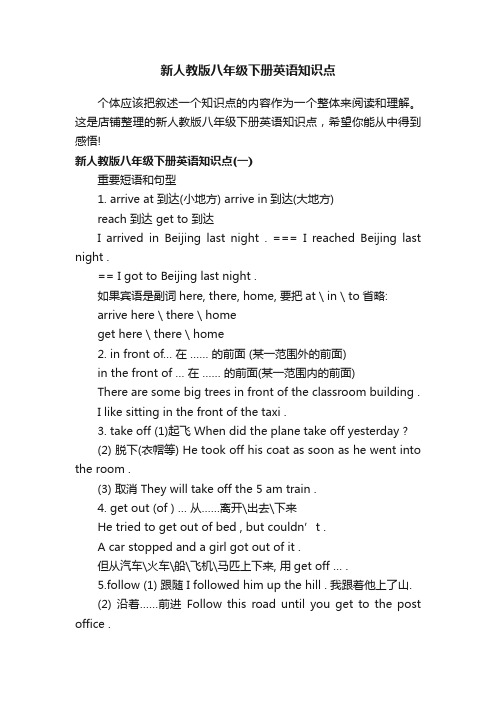
新人教版八年级下册英语知识点个体应该把叙述一个知识点的内容作为一个整体来阅读和理解。
这是店铺整理的新人教版八年级下册英语知识点,希望你能从中得到感悟!新人教版八年级下册英语知识点(一)重要短语和句型1. arrive at 到达(小地方) arrive in到达(大地方)reach 到达 get to 到达I arrived in Beijing last night . === I reached Beijing last night .== I got to Beijing last night .如果宾语是副词here, there, home, 要把at \ in \ to省略:arrive here \ there \ homeget here \ there \ home2. in front of… 在…… 的前面 (某一范围外的前面)in the front of … 在…… 的前面(某一范围内的前面)There are some big trees in front of the classroom building .I like sitting in the front of the taxi .3. take off (1)起飞 When did the plane take off yesterday ?(2) 脱下(衣帽等) He took off his coat as soon as he went into the room .(3) 取消 They will take off the 5 am train .4. get out (of ) … 从……离开\出去\下来He tried to get out of bed , but couldn’t .A car stopped and a girl got out of it .但从汽车\火车\船\飞机\马匹上下来, 用get off … .5.follow (1) 跟随 I followed him up the hill . 我跟着他上了山.(2) 沿着……前进Follow this road until you get to the post office .顺着这条路一直到邮局.(3) 听懂,理解Could you speak more slowly ? I can’t follow you .(4 )follow sb. to do sth. 跟着某人做某事Please follow me to read the story .6. amazing 形容词,修饰名词令人惊奇的, 令人惊讶的what an amazing book !amaze 动词使某人惊讶 Your letter amazed me .be amazed at … 对…… 感到惊讶 Everyone was amazed at the bad news .7. shout at 大声喊叫多指因生气而非善意的大声叫喊Don’t shout at the little boy . He is too young .shout to 大声喊叫多指因距离远而不得不大声叫喊We should shout to him , or he can’t hear us .8. happen 发生具体事件偶然的没有预见的发生(1 ) happen to do sth. 碰巧做某事I happened to meet one of my old friends in the park yesterday .(2 ) sth happens to sb. 某人发生了某事An car accident happened to him last month .上个月他发生了交通事故.take place发生 (1) 按计划进行或按计划发生Great changes have taken place in China in recent years .最近几年中国发生了巨大的变化.(2 ) (运动\ 活动\会议等) 举行The meeting will take place next Friday .take the place of 代替, 取代Plastics can sometimes take the place of wood and metal .塑料有时能代替木材和金属.take one’s place 坐某人的位置, 代替某人的职务.Come to take my place . my seat is near the window .9. anywhere 任何地方常用于否定句或疑问句中.Did you go anywhere last night ? You can’t get it anywhere .somewhere 某个地方用于肯定句come and see me . Then we’ll go out somewhere .everywhere 处处, 到处 === here and thereI can’t find m y pen though I looked for it everywhere\ here and there .10. silence 名词, 寂静 \ 无声There’s nothing but silence in the room . 屋内寂静无声 .Keep in silence . 保持沉默.silent 形容词, 沉默的, 寂静的The old house was quite silent . 这所老房子寂静无声.The cat moved on silent feet . 那只猫无声地走动着.11. hear 听到 Can you hear someone knocking at the door ?(1) hear of 听说 , 后接表示人或物的词I have never heard of him before . 我以前从来没有听说过他.( 2 ) hear about 听说, 后接表示事件的名词I’ve just heard about his illness .我刚刚听说他生病的事.Have you heard about the accident ? 你听说了那场事故吗?(3 ) hear from 收到某人的来信I heard from my daughter in New York yesterday .我昨天收到在纽约的女儿的来信.12. 主语 + be + one of the + 形容词最高级 + 复数名词 + in \ of 短语 .…… 是……中最……的……之一.This was one of the most important events in modern American history .这是美国历史上最重要的事件之一.Shanghai is one of the most beautiful cities in china .13. experience (1)名词经验, 不可数名词 ; 经历, 体验, 可数名词Have you had any experience of fishing ? 你有钓鱼的经验吗?Could you tell us about your experiences in Africa ?你能给我们谈谈你在非洲的经历吗?(2) 动词经历, 感觉The children experienced many difficulties this time .这次孩子们经历了许多困难.experienced 形容词有经验的be experienced in \at doing sth. == have much experience in \ at doing sth.做某事很有经验.She is an experienced teacher .他是一个经验丰富的教师.He is very experienced in \at repairing cars . 他修车很有经验.14. as … as … 和…… 一样… . 两个as之间用形容词或副词的原形.He works as carefully as she . 他和她一样工作认真.She is as tall as her mother . 她和母亲一样高.not as … as…. 不如某人…he isn’t as \ so old as he looks . 他不像看起来那么老.She doesn’t run as \ so fast as her brother .她不如她哥哥跑得那么快.15. have fun == have a good\ great\ wonderful time ==enjoy oneself玩得开心,过得愉快Did you have fun at the party ?== Did you have a good\ great \ wonderful time ?== Did you enjoy yourself ?have fun doing sth.开心做某事I’m just having fun playing the guitar .16. accident 事故, 意外遭遇 He was killed in an accident .他死于一起意外事故.traffic accident 交通事故 Many people die in traffic accidentsevery year .by accident 偶然, 意外地 We met at the airport by accident .17. scared 恐惧的, 害怕的afraid恐惧的, 害怕的I’m very scared \ afraid . 我很害怕.be scared \ afraid of sth 害怕某物 Are you scared \ afraid of snakes ?be scared \ afraid to do sth害怕做某事He is scared \ afraid to go out at night .be scared \ afraid of doing sth害怕做某事He is scared \ afraid of going out at night .18. think about 考虑(某个计划) They are thinking about moving to Beijing .think of 认为 What do you think of the movie ?=== how do you like the movie ?你认为这部电影怎么样?think over 仔细思考 We need a few days to think over this matter .新人教版八年级下册英语知识点(二)感叹句.1. what 引导的感叹句(1) What a beautiful girl (she is ) ! 多么美的姑娘呀 !(2) What a clever boy ( he is ) ! 多么聪明的男孩呀 !(3) What interesting pictures ( they are ) ! 多么美的图片呀 !(4) What tall buildings ( they are ) ! 多么高的楼呀 !(5) What delicious food ( it is ) ! 多么可口的食物呀 !(6) What bad weather ( it is ) ! 多么坏的天气呀 !规律: what + ( a\ an ) + 形容词 + 名词 ( + 主语 + 谓语) + !名词为不可数名词或复数名词时, 形容词前面不能有a\ an .2. how 引导的感叹句(7) How heavy the box is ! 多么重的箱子呀!How fast he runs ! 他跑得多快呀!(8) How careful the girl is ! 多么细心的姑娘呀!How well she plays the piano ! 她的钢琴弹得多好呀!如果说明的是人或物, 两种感叹句可替换. ( 以上(1) 到(8) 句 )新人教版八年级下册英语知识点(三)过去进行时:1.过去进行时的用法:(1)过去某一时刻正在进行的动作。
人教版八年级英语下册重点知识总结doc
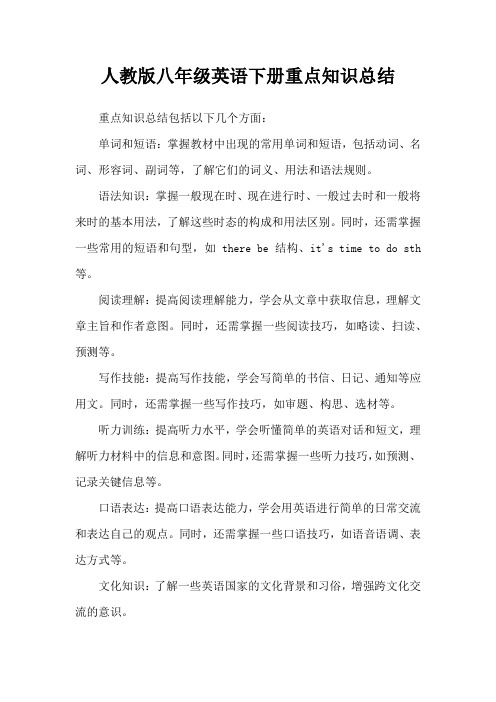
人教版八年级英语下册重点知识总结
重点知识总结包括以下几个方面:
单词和短语:掌握教材中出现的常用单词和短语,包括动词、名词、形容词、副词等,了解它们的词义、用法和语法规则。
语法知识:掌握一般现在时、现在进行时、一般过去时和一般将来时的基本用法,了解这些时态的构成和用法区别。
同时,还需掌握一些常用的短语和句型,如there be结构、it's time to do sth 等。
阅读理解:提高阅读理解能力,学会从文章中获取信息,理解文章主旨和作者意图。
同时,还需掌握一些阅读技巧,如略读、扫读、预测等。
写作技能:提高写作技能,学会写简单的书信、日记、通知等应用文。
同时,还需掌握一些写作技巧,如审题、构思、选材等。
听力训练:提高听力水平,学会听懂简单的英语对话和短文,理解听力材料中的信息和意图。
同时,还需掌握一些听力技巧,如预测、记录关键信息等。
口语表达:提高口语表达能力,学会用英语进行简单的日常交流和表达自己的观点。
同时,还需掌握一些口语技巧,如语音语调、表达方式等。
文化知识:了解一些英语国家的文化背景和习俗,增强跨文化交流的意识。
人教版八年级下册英语知识点梳理总结

千里之行,始于足下。
人教版八年级下册英语知识点梳理总结人教版八年级下册的英语知识点主要包括以下内容:
1. 时态和语态
- 现在进行时
- 一般过去时
- 过去进行时
- 一般将来时
- 用被动语态表达
- 过去将来时
2. 介词
- 表示时间的常用介词
- 表示地点的常用介词
- 表示方式的常用介词
- 表示原因的常用介词
- 表示目的的常用介词
- 表示比较的常用介词
- 表示运动方向的常用介词
3. 短语和固定搭配
- 动词短语
- 名词短语
- 形容词短语
4. 从句
- 定义性从句
第1页/共3页
锲而不舍,金石可镂。
- 修饰性从句
- 原因状语从句
- 结果状语从句
- 条件状语从句
- 目的状语从句
- 时间状语从句
- 地点状语从句
5. 连词
- 并列连词
- 选择连词
- 原因连词
- 结果连词
- 条件连词
- 转折连词
- 目的连词
- 时间连词
- 地点连词
6. 数词
- 基数词
- 序数词
- 分数和百分数
7. 非谓语动词
- 不定式
- 动名词
- 现在分词
- 过去分词
- 不定式作定语
千里之行,始于足下。
以上是人教版八年级下册英语知识点的梳理总结,希望能对你有所帮助。
如有任何更多的问题,请随时提问。
第3页/共3页。
(完整版)最新人教版八年级英语下册各单元语法点汇总
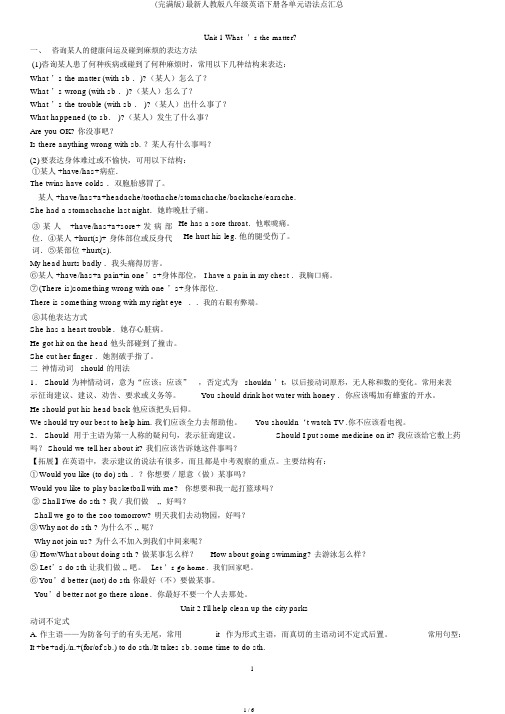
Unit 1 What ’s the matter?一、咨询某人的健康问运及碰到麻烦的表达方法(1)咨询某人患了何种疾病或碰到了何种麻烦时,常用以下几种结构来表达:What ’s the matter (with sb .)?(某人)怎么了?What ’s wrong (with sb .)?(某人)怎么了?What ’s the trouble (with sb . )?(某人)出什么事了?What happened (to sb. )?(某人)发生了什么事?Are you OK? 你没事吧?Is there anything wrong with sb. ?某人有什么事吗?(2)要表达身体难过或不愉快,可用以下结构:①某人 +have/has+病症.The twins have colds .双胞胎感冒了。
某人 +have/has+a+headache/toothache/stomachache/backache/earache. She had a stomachache last night.她昨晚肚子痛。
③某人+have/has+a+sore+发病部位.④某人 +hurt(s)+ 身体部位或反身代词.⑤某部位 +hurt(s).He has a sore throat.他喉咙痛。
He hurt his leg. 他的腿受伤了。
My head hurts badly .我头痛得厉害。
⑥某人 +have/has+a pain+in one’s+身体部位,I have a pain in my chest .我胸口痛。
⑦(There is)something wrong with one ’s+身体部位.There is something wrong with my right eye..我的右眼有弊端。
⑧其他表达方式She has a heart trouble.她存心脏病。
He got hit on the head 他头部碰到了撞击。
八年级下册英语知识点总结人教版
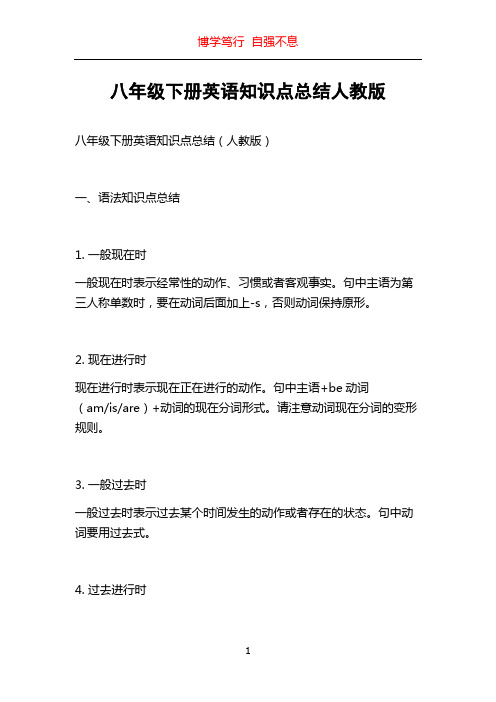
八年级下册英语知识点总结人教版八年级下册英语知识点总结(人教版)一、语法知识点总结1. 一般现在时一般现在时表示经常性的动作、习惯或者客观事实。
句中主语为第三人称单数时,要在动词后面加上-s,否则动词保持原形。
2. 现在进行时现在进行时表示现在正在进行的动作。
句中主语+be动词(am/is/are)+动词的现在分词形式。
请注意动词现在分词的变形规则。
3. 一般过去时一般过去时表示过去某个时间发生的动作或者存在的状态。
句中动词要用过去式。
4. 过去进行时过去进行时表示过去某个时间正在进行的动作。
句中主语+was/were+动词的现在分词形式。
5. 一般将来时一般将来时表示将来某个时间即将发生的动作或者存在的状态。
句中主语+will+动词原形。
否定形式为主语+will not(won't)+动词原形。
6. be going tobe going to表示打算或者计划进行某个动作。
句中主语+be动词(am/is/are)+going to+动词原形。
7. wish的用法wish可以表示希望或者后悔,后面接的从句用虚拟语气,即简单过去时。
例如:I wish I were taller.8. 一般条件句一般条件句表示条件与结果之间的关系,有真实条件和虚拟条件两种。
真实条件用一般现在时表示,虚拟条件用一般过去时表示。
9. 祈使句祈使句用来表示建议、命令、请求等,常以动词原形开头,否定形式前加don't。
10. 感叹句感叹句用来表达强烈的感觉或者惊讶的情绪,常常以How开头。
二、词汇知识点总结1. 动词的三种形式动词有原形、过去式和过去分词三种形式。
原形用于一般现在时,过去式用于一般过去时,过去分词用于完成时等。
2. 名词的复数形式名词复数形式的构成方法有规律可循:大部分名词在词尾加-s,以s、x、o、sh、ch结尾的名词在词尾加-es,以辅音字母+y结尾的名词把-y变为-i,再加-es。
3. 形容词的比较级和最高级形容词的比较级和最高级分别用于比较两个事物和三个或三个以上事物之间的程度差异。
新人教版英语八年级下册U1-U8必会知识点

新人教版英语八年级下册U1-U8必会知识点(总8页)--本页仅作为文档封面,使用时请直接删除即可----内页可以根据需求调整合适字体及大小--Unit 1 What’s the matter?一、重点短语1. have a fever 发烧2. have a cough 咳嗽3. have a toothache 牙疼4. talk too much 说得太多5. drink enough water 喝足够的水6. have a cold 受凉;感冒7. have a stomachache 胃疼8. have a sore back 背疼9. have a sore throat 喉咙痛10. lie down and rest 躺下来休息11. hot tea with honey 加蜂蜜的热茶12. see a dentist 看牙医13. get an X-ray 拍X 光片14. take one’s temperature 量体温15. put some medicine on sth. 在…上面敷药16. feel very hot 感到很热17. sound like 听起来像18. all weekend 整个周末19. in the same way ♦以同样的方式20. go to a doctor 看医生21. go along 沿着……走22. on the side of the road 在马路边23. shout for help 大声呼救24. without thinking twice 没有多想25. get off 下车26. have a heart problem 有心脏病27. to one’ s surprise 使......惊讶的28. thanks to 多亏了;由于29. in time 及时30. save a life 挽救生命31. get into trouble 造成麻烦32. right away 立刻;马上33. because of 由于34. get out of 离开;从……出萍35. hurt oneself 受伤36. put a bandage on sth. 用绷带包扎37. fall down 摔倒38. feel sick 感到恶心39. have a nosebleed 流鼻血40. cut his knee 割伤他的膝盖41. put her head back 把她的头向后仰42. have problems breathing 呼吸困难43. mountain climbing 登山运动44. be used to doing sth. 习惯做某事45. run out (of) 用完;用尽46. so that 以便47. so. . . that 如此… …以至于…48. be in control of 掌管;管理49. in a difficult situation 在闲境屮50. keep on doing sth. 继续或坚持做某事51. make a decision 做出决定52. take risks 冒险53. give up 放弃二、重点句型1. Wha t’ s the matter?Wha t’ s the matter with you? = What’s the trouble w ith you? = Wha t’ s wrong with you?你怎么了?2. W hat should she do?她该怎么办呢?Should I take my temperature?我应该量一下体温吗?主语+ should/shouldn’t + 动词原形. ..①You should lie down and rest.你应该躺下休息一会儿。
(完整版)新人教版八年级英语下册各知识点归纳总结
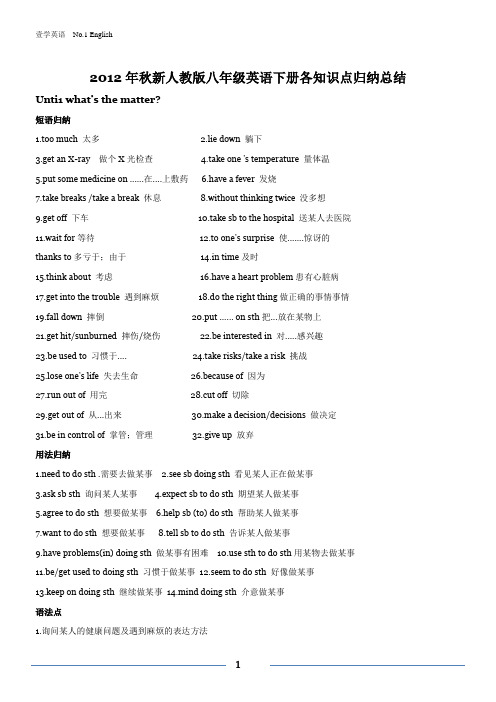
2012年秋新人教版八年级英语下册各知识点归纳总结Unti1 what’s the matter?短语归纳1.too much 太多2.lie down 躺下3.get an X-ray 做个X光检查4.take one ’s temperature 量体温5.put some medicine on ......在....上敷药6.have a fever 发烧7.take breaks /take a break 休息8.without thinking twice 没多想9.get off 下车10.take sb to the hospital 送某人去医院11.wait for等待12.to one’s surprise 使.......惊讶的thanks to多亏于;由于14.in time及时15.think about 考虑16.have a heart problem患有心脏病17.get into the trouble 遇到麻烦18.do the right thing做正确的事情事情19.fall down 摔倒20.put ...... on sth把...放在某物上21.get hit/sunburned 摔伤/烧伤22.be interested in 对.....感兴趣23.be used to 习惯于.... 24.take risks/take a risk 挑战25.lose one’s life 失去生命26.because of 因为27.run out of 用完28.cut off 切除29.get out of 从...出来30.make a decision/decisions 做决定31.be in control of 掌管;管理32.give up 放弃用法归纳1.need to do sth .需要去做某事2.see sb doing sth 看见某人正在做某事3.ask sb sth 询问某人某事4.expect sb to do sth 期望某人做某事5.agree to do sth 想要做某事6.help sb (to) do sth 帮助某人做某事7.want to do sth 想要做某事8.tell sb to do sth 告诉某人做某事9.have problems(in) doing sth 做某事有困难e sth to do sth用某物去做某事11.be/get used to doing sth 习惯于做某事12.seem to do sth 好像做某事13.keep on doing sth 继续做某事14.mind doing sth 介意做某事语法点1.询问某人的健康问题及遇到麻烦的表达方法2.情态动词should的用法情态动词should的用法表示劝告与建议,也表义务与责任第一人称问句中,征询建议要记清3.不定代词的用法相关阅读方法推理判断阅读法精细解读1. What’s the matter (with you)? 怎么了?出什么事了?What’s the trouble/ the problem / wrong with sb./ sth.?2. I had a cold.我感冒了。
人教版八下英语知识点笔记
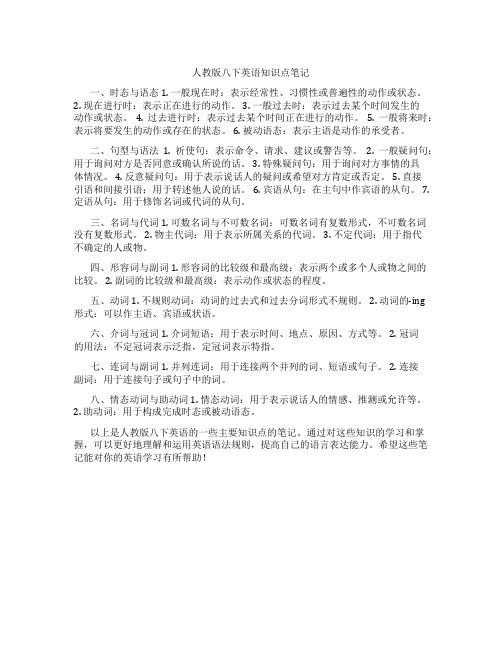
人教版八下英语知识点笔记一、时态与语态 1. 一般现在时:表示经常性、习惯性或普遍性的动作或状态。
2. 现在进行时:表示正在进行的动作。
3. 一般过去时:表示过去某个时间发生的动作或状态。
4. 过去进行时:表示过去某个时间正在进行的动作。
5. 一般将来时:表示将要发生的动作或存在的状态。
6. 被动语态:表示主语是动作的承受者。
二、句型与语法1. 祈使句:表示命令、请求、建议或警告等。
2. 一般疑问句:用于询问对方是否同意或确认所说的话。
3. 特殊疑问句:用于询问对方事情的具体情况。
4. 反意疑问句:用于表示说话人的疑问或希望对方肯定或否定。
5. 直接引语和间接引语:用于转述他人说的话。
6. 宾语从句:在主句中作宾语的从句。
7. 定语从句:用于修饰名词或代词的从句。
三、名词与代词 1. 可数名词与不可数名词:可数名词有复数形式,不可数名词没有复数形式。
2. 物主代词:用于表示所属关系的代词。
3. 不定代词:用于指代不确定的人或物。
四、形容词与副词 1. 形容词的比较级和最高级:表示两个或多个人或物之间的比较。
2. 副词的比较级和最高级:表示动作或状态的程度。
五、动词 1. 不规则动词:动词的过去式和过去分词形式不规则。
2. 动词的-ing形式:可以作主语、宾语或状语。
六、介词与冠词 1. 介词短语:用于表示时间、地点、原因、方式等。
2. 冠词的用法:不定冠词表示泛指,定冠词表示特指。
七、连词与副词 1. 并列连词:用于连接两个并列的词、短语或句子。
2. 连接副词:用于连接句子或句子中的词。
八、情态动词与助动词 1. 情态动词:用于表示说话人的情感、推测或允许等。
2. 助动词:用于构成完成时态或被动语态。
以上是人教版八下英语的一些主要知识点的笔记。
通过对这些知识的学习和掌握,可以更好地理解和运用英语语法规则,提高自己的语言表达能力。
希望这些笔记能对你的英语学习有所帮助!。
- 1、下载文档前请自行甄别文档内容的完整性,平台不提供额外的编辑、内容补充、找答案等附加服务。
- 2、"仅部分预览"的文档,不可在线预览部分如存在完整性等问题,可反馈申请退款(可完整预览的文档不适用该条件!)。
- 3、如文档侵犯您的权益,请联系客服反馈,我们会尽快为您处理(人工客服工作时间:9:00-18:30)。
新人教版|八年级下册所有语言点Unit1 what' s the matter?1. It’s +形容词+ for sb. + to do sth. 做某事对某人来说是…的。
It’s important to do sth. 做某事很重要。
It’s important for me to eat a balanced diet. 平衡饮食对我来说是很重要的.It’s easy to do sth. 做某事是容易的。
It’s easy for us to find out the answer. 找出答案对我们来说是容易的2. 情态动词should的用法should是情态动词,它的基本用法是必须和其他动词一起构成谓语。
意为"应该......"。
should(应当,应该)用于所有人称,表示劝告或建议。
eg. ---I have a very bad cold. 我感冒很厉害。
---You should lie down and have a rest. 你应该躺下,多喝水。
3. maybe与may be(1)maybe是副词,译为“也许、可能”,相当于“perhaps”。
如:Maybe he can answer the question. 也许他能回答那个问题。
He maybe is from the USA, too. 他可能也来自美国。
(2)may be中的may为情态动词,译为“可能是......”。
如:He may be from the USA, too. 他可能也来自美国。
She may be our English teacher. 她可能是我们的英语老师。
4. few、a few、little、a little的区别和联系:(1)few / a few用来修饰可数名词,few表示否定意义,没有,几乎没有;a few表示肯定意义,有几个。
例如:He has few friends here, he feels lonely. 他这里没朋友,他感觉寂寞。
There are a few eggs in the basket. 篮子里有几个鸡蛋。
(2)little / a little用来修饰不可数名词,little表示否定意义,没有,几乎没有;a little 表示肯定意义,有一点儿。
例如:There is little ink in my bottle. Can you give me a little ink? 我的瓶子里没有墨水了,你能给我点儿墨水吗?5. not…until 直到…(否定句) 才......,动词为短暂性或瞬间性动词。
She didn’t leave until we came.He went shopping after he got up.=He didn’t go shopping until /before he got up....until/till 直到......(肯定句)动词为延续性动词We stayed here till/until 12 o’clock.Unit2 I'll help clean the city parks.1. 短语动词小结常见动词短语结构有下面几种:(1)动词+副词如:give up 放弃;turn off 关掉;stay up 熬夜这种结构有时相当于及物动词,如果其宾语是代词,就必须放在动词和副词之间,如果是名词,则既可插在动词和副词之间,也可放在短语动词后。
(2)动词+介词如:listen of 听;look at 看;belong to 属于这种结构相当于及物动词,后面跟宾语。
(3)动词+副词+介词如:come up with 提出,想出;run out of 用完,耗尽(4)动词+名词+介词如:take part in参加;catch hold of 抓住2. each 每个,各自的,强调事物的个别情况,常与of 连用every 每个,每一个的,一切的,有“全体”的意思不能与of 连用3. help sb. (to) do 帮助某人做某事help him (to) studyhelp sb. with sth. 帮助某人做某事help him with Englishhelp do 帮助做某事help study4. spend...doing... 花费…做…I spent a day visiting Beijing. 我花了一天的时间去参观北京。
spend…on sth. 花费…在…I spent 3 years on English.5. join 参加(指参加团体、组织) 如:join the Party 入党take part in 参加(指参加活动) 如:take part in sports meeting 参加运动会6. run out 与run out of(1)run out (become used up). 其主语往往为物。
如时间,食物,金钱,油等,本身就含有被动意义。
His money soon ran out. 他的钱很快就花光了。
Our time is running out. 我们剩下的时间不多了。
(2)run out of 主语为人,表示主动含义。
He is always running out of money before pay day. 他总是在发工资的日子还没有到就把钱花完了。
两者在一定条件下可以互换如:The petrol is running out. 汽油快用完了= We are running out of petrol.Our time is running out. 我们剩下的时间不多了。
= We are running out of time.7. work out(1)结局,结果为The strategies that he came up with worked out fine. 他提出的这个策略效果很好。
(2)算出,制订出,消耗完(精力等)He never seems to be worked out. 他好像永远不会疲乏似的。
He worked out a plan. 他制订了一个计划。
I have worked out our total expenses. 我已经算出了我们总的费用。
8. hang out 闲荡闲逛I like to hang out at mall with my friends. 我喜欢和我的朋友一起去购物中心闲荡。
9. be able to do 能,会be unable to do 不能,不会10. for sure 确实如此,毫无疑问You don’t have money. That’s for sure. 你没有钱,这是毫无疑问的。
11. fill…with…使…充满…用…填充…She filled the bowl with water. 她用水填满碗。
12. hand out 分发hand out bananasgive out 分发give out sth to sb. 分….给某人give up doing 放弃…give up smoking 放弃吸烟give away 赠送捐赠give away money to kidsgive sb. sth. 给某人某东西give me money 给我钱give sth. to sb. 给某人某东西give money to me 给我线13. help sb. out 帮助…做事,解决难题(摆脱困境)I can’t work out this math problem. Please help me out. 我不能算出这道数学问题,请你帮我解决。
14. train n. 火车v. 训练train sb. to do. 训练某人做某事She trains her dog to fetch things. 她训练她的狗去取东西。
15. at once == right away 立刻马上如:Do it at once. 马上去做。
I’ll go there at once/ right away. 我马上去那里。
16. one day 有一天(指将来/过去)some day 有一天(指将来) 如:One day I went to Beijing. 有一天我去了北京。
Some day I’ll go to Beijing. 有一天我将去北京。
Unit3 Could you please clean your room?1. 关于to 的短语总结have to do sth. 不得不/必须做某事need to do sth. 需要做某事hate to do sth. 讨厌做某事like to do sth. 喜欢做某事want to do sth. 想做某事love to do sth. 热爱做某事forget to do sth. 忘记做某事start to do sth. 开始做某事begin to do sth. 开始做某事ask sb to do sth. 请某人做某事2. ---Could you please clean your room?---Yes, sure. / Sorry, I can't. I have to do my homework first.---Could I please use the car?---Sure. / Certainly. / Of course. / No, you can't. I have to go out.在表示请求帮助或请求允许的疑问句中,常用could 代替can,以表示礼貌,委婉或不确定的语气,而can 则不具备这些语气。
这种情况下不能把could 看作can 的过去式。
以上两句中用could 是为了表示礼貌的请求。
表示请求帮助或请求允许时,除了can, could 之外,还可以用may,句子的表达方式也各有不同,可以用不同的方式来表示同一个概念。
例:Could / Can / May I use your car for a day?作允答可以各种各样:如同意可以说Yes,或Sure 或Certainly,还可说Yes, (do) please.或Of course. (you may / can). 或That's OK / all right.如果不同意,可以说I'm sorry you can't. 或I'm really sorry, but I have to use it today. 要避免说No, you can't. 这样显得很不礼貌。
